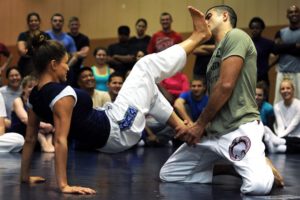Make Time for Serious Leisure
0 comment
In case you aren’t aware, all leisure is not the same, nor is it only what most think it is. As Merriam-Webster so nicely puts it, “freedom provided by the cessation of activities.” In 1973, Robert Stebbins began his work that would eventually lead to a three-part typology of leisure: “casual leisure,” “project-based leisure” and “serious pursuits.” Serious pursuits is, itself, divided into subcategories: “devotee work” and “serious leisure.” It is serious leisure that just may make you a better leader.
According to Stebbins, serious leisure is “the systematic pursuit of an amateur, hobbyist, or volunteer core activity that is highly substantial, interesting, and fulfilling and where, in the typical case, participants find a career in acquiring and expressing a combination of its special skills, knowledge, and experience.” This sounds an awful lot like work to me, not leisure. In fact, one of the six factors that differentiate serious leisure from casual leisure is “availability of a leisure career.” If that isn’t an oxymoron, I’m not sure what is. But before laughing at the inherent contradictions in the nomenclature (as well as the many people we know who are “serious leisurists”), consider the data that links serious leisure pursuits with more successful leaders.
Picking up on prior research that has looked at specific leisure pursuits (for example, pilots) and leadership success (for example, pilots lead more innovative companies, or more innovative companies seek pilots as their leaders—the direction is still now clear), three researchers from a Dutch university scoured public documents to identify the “hobbies” of people who, at the beginning of this year, were CEOs of S&P 500 companies. They found 56 with “serious leisure” pursuits; they dug deeper into these 56 to learn how these serious leisure pursuits connected to these folks leadership. In addition, they interviewed 17 CEOs of Fortune 500, S&P 500 and “similarly sized” US companies to learn about their hobbies and to see if any had serious leisure activities and, if so, how did it relate to their corporate leadership.
Here is what they found:
- Serious leisure helps to decompress and shut-down. As the complexity of running an organization has increased, so has the stress of the job. Stress and clear, especially strategic, thinking do not go hand in hand. Research on stress reduction shows that casual leisure isn’t sufficient to provide that break, the necessary “shutting down;” serious leisure, however, does the trick. And while some of the subjects in this research pursued Brazilian Jiu Jitsu and flying, others collected stickers, created hand-made cards, or played in a band.
- Serious leisure ensures a constant push for self-improvement. While many of the research participants participated in competitive pursuits and, therefore, could and did push themselves to win medals and competitions, it isn’t the winning that these CEOs pointed to as the valuable leadership lessons, rather, it was the lessons of pushing to reach your greatest potential, the push to always do one’s very best.
- Serious leisure teaches humility. While CEOs are always the top of their packs at work, that is not always the case when they are engaged in their serious leisure activities. Playing in a band, for example, was described by one CEO as being “the hired help.” Research suggests that humble CEOs are more likely to be in touch with all levels of the organization chart.
- Serious leisure allows for total control. With the ever-growing complexity of running organizations, feelings of “I’ve got this under control” are harder to come by. The need to feel in control, however, has not changed. Being in control in one sphere of your life can shape greater confidence in another.
- Serious leisure may provide different opportunities to commune with followers. Those CEOs who engage in serious leisure that others on staff may do as well, such as various athletic activities, meet other employees in that athletic venue. Conversations take place, positions on the work-day organizational chart fade, more honest dialogue may happen.
- Serious leisure reinforces authentic leadership. Harvard’s Bill George introduced this concept in 2003, noting that, among other things, authentic leaders are self-aware; genuine; clear about, and act in accordance with, their core values, take responsibility for their actions, and are the same with family, friends and colleagues. There is no performance at work and another elsewhere. Serious leisure is part of the story of an authentic leader.
- Serious leisure provides lessons that will make you a better leader.
To executive directors, and so many others in the nonprofit sector (and beyond) who consistently gripe about a lack of work-life balance, who continually wring their hands over their inability to exercise or take vacations or relax, etc., take a lesson from this study: you are harming yourselves and your organization’s success. By failing to invest in (serious) leisure, you are doing a disservice to the very thing you are “sacrificing” yourself to serve.
The opinions expressed in Nonprofit University Blog are those of writer and do not necessarily reflect the opinion of La Salle University or any other institution or individual.

